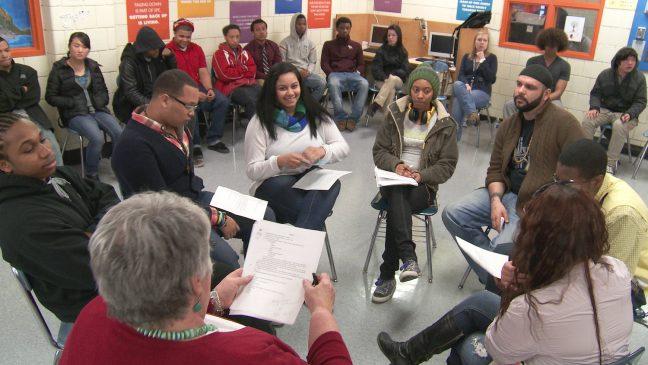The Dane County TimeBank will share its far-reaching relevance in an upcoming screening of “Circle Up,” which details how restorative justice establishes forgiveness, accountability and growth.
An award-winning documentary directed by Julie Mallozzi, “Circle Up” follows a group of mothers as they engage in restorative justice for their sons who were victims of violent murder. Together, they weave their stories to forge a narrative of forgiveness, Lorrie Hurckes Dwyer, executive director of the Dane County TimeBank, said.
“It’s difficult sometimes for people to understand the benefits and the power of restorative justice,” Dwyer said. “[It is] is the power of the connections, the power of hearing everybody’s story and looking at a whole situation.”
The film centers on Janet Connors, a mother seeking restorative justice for her young son. After the murder trial, Connors sought out two of the accused men and offered them a chance to be forgiven. Afterwards, she succeeded in leading victim-offender conversations around Massachusetts.
Dane County TimeBank, a community service organization, who advocates for similar restorative justice initiatives in Madison, is presenting the upcoming screening and panel discussion for “Circle Up.” Straying from the traditional pursuit of punitive justice, restorative justice helps facilitate constructive dialogue between perpetrators and victims of crime, Dwyer said.

The organization has coordinated Youth Court projects, which discipline juvenile crime through a peer-held trial. Instead of receiving a mark on their record, these teenagers and young adults have the opportunity to be held accountable and relate to a past mistake with the potential for growth.
“Our big goals were associated with just shifting some of the power dynamics around youth and adult authority figures, law enforcement or school staff,” Dwyer said. “Youth could work with youth and hold youth accountable — we [recognized] the value of having everyone’s voice be heard in a situation and looking at a situation more holistically than punitively.”
The Dane County TimeBank offers an accessible version of restorative justice for Madison’s high school youth. It has initiated Youth Courts in four of the city’s public schools as well as in Verona High School.
For violations that would result in a police citation, the TimeBank collaborates on citywide initiatives to offer restorative justice proceedings for youth between the ages of 12 to 16 versus through the traditional system.
University Housing employee reportedly defrauded university of more than $100,000
For an older demographic, Dane County offers community restorative court systems, which refer youth between the ages of 17 and 25 to restorative justice circles, a practice that Connors upholds in “Circle Up.”
Despite the resources available in Dane County, not everyone has access to them, Dwyer said. She believes dialogue surrounding restorative justice is important to have in the community. For the TimeBank, bringing “Circle Up” to Madison is an engaging initiative to raise more local awareness.

“I think it’s so great we’re doing this film — I think there’s a lot of hesitation to use a restorative justice process for a situation like in this film,” Dwyer said. “I’m really happy to be able to talk about it in a way that it can be much more than what it is.”
Reduced staff, increased autopsies belabor Dane County Coroner’s Office
The Dane County TimeBank will screen the“Circle Up” documentary and panel discussion at the Wisconsin Institutes for Discovery on March 10. Doors will open at 1:30 p.m. for general admission and the event will run until 5 p.m.


